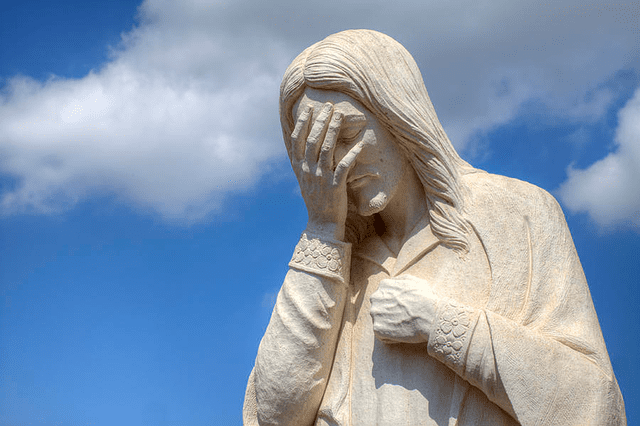
A friend posted the following commentary today, about the experience of a mutual friend of ours talking to a priest lately:
Here’s the scenario: some poor brave soul has gone to the good father for guidance or understanding. He/She has been traumatized by early childhood sexual abuse and consequently struggles with any given one of the host of psychological terrors or mental health battles associated with this, armed with her faith, her therapist, her doctor, her medication, her coping habits and her good friends.
Does the Catholic priest:
A) Listen quietly for a long time and then cry with him/her confessing that he doesn’t even know what to say in the face of such horror and pain?
B) Tell her to keep coming to the Sacraments if he/she is able but give them a dispensation if they are unable, fully understanding why Church might be triggering in these situations?
C) Encourage him/her to keep going to the doctor, keep taking the meds, keep up with therapy and reach out to her friends or him if they ever need support or need to just talk and affirm that God is always near and is present in their sufferings and loves them?
D) Take this opportunity to talk about how he believes early childhood abuse could be a portal to the demonic, cite the book he read that from or his favorite exorcist and tell him/her to pray unceasingly that they don’t become tormented and possessed by demons?
Now good people of common sense, Catholic or otherwise; which was the answer that was so tone deaf, so wrong, so unbelievably clueless that you didn’t want to believe that this was a real life scenario that could and does happen to a person suffering from anxiety, depression or PTSD when they came to talk to a Catholic priest? And why? Extra points if you can rebuff what the priest gave as a wrong answer.
It was D, for the record. My friend was told by a priest that her childhood sexual abuse made her vulnerable to demonic attack and tell them they have to pray to make the demons go away.
I know I have a lot of readers who have survived physical, sexual, emotional or spiritual abuse, so I want to assure every one of you: you are definitely not a portal for the demonic. You are a person who was hurt in a particularly dehumanizing, despicable way. It hurt you so badly that your brain and your nervous system, your actual physical body, sustained damage, and that damage causes suffering you have to deal with on a regular basis. Due to your injury you might have come down with depression, self-loathing, anxiety, hypervigilance, insomnia, panic attacks, eating disorders, phobias, chronic pain, chronic fatigue, and a host of other heavy crosses. The symptoms of trauma are legion, they’re hellish to endure, and they can make you feel like you might be possessed, but you’re not. You’re hurt.
The symptoms of trauma can also tend to look, to untrained observers, like something out of a horror movie. And untrained observers of a religious bent might well respond to you as if there are demons at work somewhere. These experiences of religious people responding in ignorance to your trauma can be extremely re-traumatizing and make matters much worse, especially if your trauma had to do with religion in the first place, so you might find yourself in a no-fun continuous loop of flashing back, getting treated like a demoniac by ignorant jerks, and flashing back harder as a result. It might get so bad that you find yourself terrified of the very idea of church– sometimes it gets so severe that just looking at religious imagery makes you sick. And this, in turn, makes people even more sure you’re possessed because we’ve all seen how possessed people act in horror movies. I’ve seen this cycle play out so often that I’m sure some psychologist has given it a name, but I don’t know what it is.
And any fool can write a book. People way more ignorant than I am have written books. Someone ignorant person might even write a book about abuse causing demonic possession because that’s what it looked like to them, and ignorant priests might read the book, and next thing you know, you’re being told by a priest that you’re a portal to hell because somebody else abused you.
But you’re not.
I promise you’re not.
You are a beloved child of God. Christ came to earth to suffer with you so that everything you’ve experienced could be taken up into Heaven and healed– and not only healed, but transformed into grace somehow. I don’t pretend to understand how that works, but I know that it’s true. You are innocent. You are worthy of love, compassion and understanding, inside and outside the church, as much as a person who has never been abused in her life. If you ever happen to see me in church, come sit with me. I’m usually in the back or hiding in the foyer, listening to Mass through a crack in the door. We can suffer together.
I also know that a lot of priests read my blog, so let me address them next.
My brothers in Christ: knock it off.
I know that being a priest doesn’t make you a clinician, but that doesn’t mean you get to be ignorant. Every one of us is required to help carry our brothers’ and sisters’ crosses. Crosses can be physical, spiritual or psychological, and Christians must not be ashamed to help with any of those. Survivors of abuse usually need clinicians to help them heal, but they also need a whole community of compassionate helpers, including you.
You need to tell abuse survivors who come to you that having trauma from abuse is no more shameful than having a broken wrist from a bicycle accident. Assure them that it’s no more likely to make you possessed than dropping a weight on your toe or getting sneezed on by somebody with bubonic plague. Help them understand they’re welcome in the church, even if they don’t always act like everybody else due to their injury. Listen with compassion. Ask questions. Humbly admit when you don’t understand something. Hand them a Kleenex if they start to cry. Tell them it’s not their fault. Make sure they’re away from their abuser and in a safe living situation now. Find a tactful way to ask whether their material needs are being met, because trauma can seriously impact a person’s ability to hold down a job but also make them terrified to ask for assistance. Do some research about the community you live in and have a list of resources at hand so you can help them get to safety and get what they need. Stand up for them if you see them being bullied by members of your congregation.
For mercy’s sake, don’t add to their agony by telling them they’re likely to be tormented by demons.
I’m not saying you can’t think of something worse to say to an abused person, but that’s definitely near the top.
(image via Pixabay)













